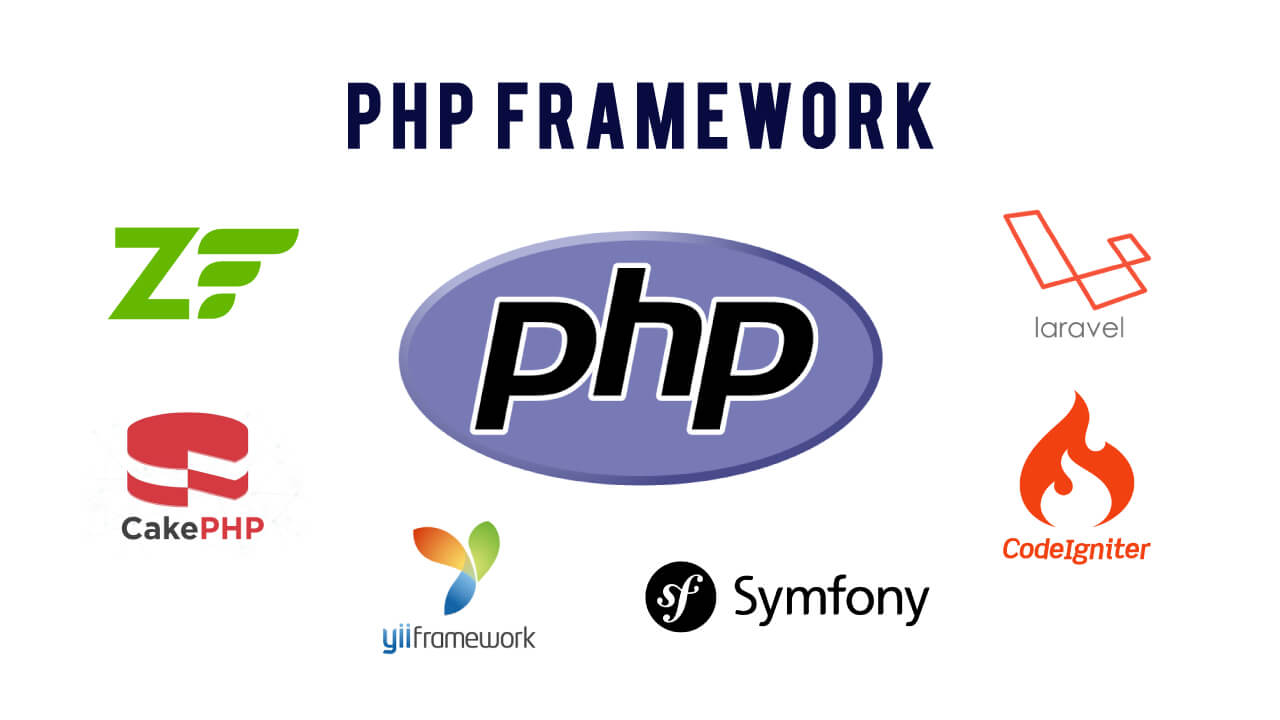
PHP web frameworks have their own ecosystems in the realm of the web development community. PHP frameworks are used to build websites and web applications of all sizes and complexity, ranging from small static websites to large scale complex enterprise content management systems.
PHP is the language of choice for web development with almost 80% of all the existing websites breathing on PHP code. It would have been beside difficult to make such a gigantic web impression by creating web applications utilizing crude PHP code starting with no outside help. It is the energy of PHP systems that has energized such a gigantic development.
WHY USE PHP WEB FRAMEWORK?
When we take a gander at present-day web improvement needs, the way to progress is speed advancement with efficient, reusable and viable code, at the same time guaranteeing versatility. The most ideal approach to accomplish this is by utilizing a current, demonstrated PHP framework.
Systems offer prepared to utilize parts, libraries, authorize demonstrated engineering, guarantee detachment of model, view and controller rationale (MVC pattern), theoretical you far from the low-level security concerns, implement document and code structure, and the rundown is very long. To put it plainly, PHP frameworks make web improvement fun and make you more beneficial.
Selecting the right framework, however, can be challenging at times. In an attempt to make the selection process a little easier, we have analyzed most of the PHP frameworks out there in the wild and listed below the 10 best.
These are the frameworks that are actively maintained, popular among the developer community, promote modern web development practices and make it possible to build websites and web applications of all sizes and complexity.
LARAVEL
Laravel is undisputedly the ruler of PHP frameworks and traverses the widths and profundities of extensive scale web application advancement. Laravel environment has rapidly become gigantic with a strong group and brags huge amounts of free instructional exercises and learning assets to kick you off inside no time.
Laravel is built to be simple, easy to learn and supports rapid application development. You get a rich set of features to bring any large scale project to life within days. Laravel comes with its own templating engine named “Blade”. The best thing about Blade is that it allows you to write plain PHP in the templates which essentially means that Blade brings no performance overheads to your application.
Another power truth about Laravel is the incorporation of “Homestead” which is the bundled Vagrant box to give you a chance to begin advancement without the bothers of introducing web server, HHVM, PHP or some other bundle on your nearby machine or server
New to the world of Laravel or PHP development, no problems, there is a dedicated website named Laracasts.com that hosts hundreds of PHP video tutorials. You can access the basic tutorials as well as the most advanced ones to master Laravel at a very minimal cost.
Laravel team has recently released “Lumen”, a micro PHP framework for the web developers who like to build lightning-fast API’s as well as Laravel based services.
You can read more about Laravel at – Laravel.com.
SYMFONY
Do you have a very complex and large scale enterprise project at hand? If yes, then Symfony 2 is the one framework to get your job done right. Symfony ecosystem as a whole consists of a large set of reusable components, vibrant and active community, Symfony framework and philosophy to take PHP to the next level.
Symfony framework gets all the superpowers from the reusable and decoupled set of components it packs within. The power features of Symfony components can be guessed from the fact that even the big brother Laravel utilizes many of Symfony components.
Symfony components fuel some of the largest open-source projects like Drupal, PHPBB, PIWIk, OROCRM and Laravel, to name a few. Symfony components also power one of the most popular templating engines named “Twig”.
Symfony framework was first released back in 2005 as open source PHP framework by interactive agency Sensiolabs. Symfony framework is available under MIT license and can be downloaded from its github repository – Github.com/symfony.
Read more about Symfony at – Symfony.com.
SYMFONY VS LARAVEL
In Short, I would go for Laravel for large scale rapid application development even with lesser experienced resources, but, if it is about complex enterprise grade application development, my preference would shift towards Symfony, with more skilled developers.
PHALCON
Phalcon is another modern framework and my personal favorite. Phalcon framework is built for speed, it is a PHP extension written in C and arguably the fastest PHP framework available as of today. Even though it is an extension written in C, it is a full-stack MVC framework and offers most of the modern features like routing, controllers, view templates, query language, Caching, and ORM, etc.
The framework beats all other frameworks by margins in performance, is easy to learn, brings in all features to develop web applications of any size and complexity, and PHP developers are loving it.
Phalcon is among the frameworks that have seen success in a very short span of time. It was released back in 2012 under a BSD license and is a perfect candidate to complete for the top slot in the world of PHP frameworks.
Slightly underrated at the moment, but that is only because developers are finding it hard to accept that a framework is delivered as PHP extension, and written in C. Phalcon, otherwise is very well document with examples and beginners can easily get started with Phalcon PHP framework.
Read more about Phalcon framework at its official website – phalconphp.com.
YII
Yii dates back to 2008 and is amongst the oldest of PHP frameworks. It was lagging behind Laravel and Symfony for the last couple of years but with the release of Yii 2.0, it is fast becoming the preferred choice for enterprise-grade web application development.
Yii 2.0 is a modern PHP framework with a complete set of features to cater to the needs of modern websites and applications development. Yii also features a very powerful and best in class code generator tool called Gii.
Also check out this bestselling course, 80% discount is on – Complete Web Developer Course 2.0
Yii framework competes with none other than Symfony when it comes to building multitenant, secure and performant (powerful caching) applications that need complex workflows. CMS and CRM are among the categories where Yii shines along with Symfony.
Yii 2 community is very active, helpful and determined to take the Yii 2 framework to the next level. It also hosts one of the best documentation you will see in the world of PHP frameworks.
YII 2 VS SYMFONY
Both Symfony and Yii2 are excellent frameworks and can deliver any modern large scale complex web application. I would personally select Symfony 2 for the sheer elegance it brings on the table but at the cost of a bit more complexity. Yii 2 has more out of the box features, a little easier to grasp and can be selected for speed development instead of Symfony.
You can read more about Yii 2 at – Yiiframework.
SLIM
PHP developers love Slim for developing Restful APIs and services, thanks to Josh Lockhart for creating this tiny beast. The best thing about starting with a micro-framework like slim is that you don’t need to spend time learning it. The codebase is so small that you can run through the entire code in a late-night session.
Slim is an open-source, sophisticated micro-framework that comes with URL routing and best in class middleware architecture. It also supports encrypted cookies, flash messages, page templates and caching apart from many other features.
Slim framework is best suited in scenarios where you want to build simple applications or API’s grounds up with full flexibility in your hands. Slim resides at the core of your application and you write the code around as required or plug existing components from other frameworks to create a fully functional web application.
Silex and Lumen are two other frameworks similar to Slim that fall into the category of micro PHP frameworks.
You can read more about Slim at – Slimframework.com.
CAKEPHP
Another giant from the old times that don’t want to succumb in front of the most sophisticated modern PHP frameworks like Laravel and Phalcon. With the latest version “CakePHP 3.0”, this framework once again is back in demand and makes a definite point that it is here to stay.
CakePHP framework was originally released back in 2005 and is now available under MIT license. You can use it free of cost in personal, open-source as well as commercial projects. CakePHP has held the spot of top PHP framework for a long time span and attracted corporates like BMW, Hyundai, Zumba, and Express as its early users. Big names, isn’t it? That reflects the early life of this beast.
CakePHP 3.0 features enhanced session management, standalone libraries and decoupled components for better modularity, improvements in ORM and many helpers.
You can read more about cakePHP at – Cakephp.org.
FUELPHP
FuelPHP is a relatively new entrant in the world of PHP frameworks, specifically when we compare it with the old giants like Codeigniter, Symfony, CakePHP, and Yii. FuelPHP is a simple, flexible, full-stack modern MVC framework that supports HMVC as well at the architecture level. FuelPHP has not been able to make a big impact ever since its release and doesn’t really have the biggest fan following.
Having said that, there is a lot happening around FuelPHP lately and it is very actively developed and upgraded with new features. The framework at its core offers everything to build an end to end web application of any size and complexity. The future of FuelPHP looks quite promising and I expect FuelPHP to gain grounds in the months to come and definitely plan to keep an eye on it.
You can check out the git repository of FuelPHP at – Fuelphp.com.
AURA
Aura doesn’t compete with full stack PHP frameworks like Phalcon or with micro PHP frameworks like Slim. Aura is a collection of library packages where each package can be used independent of the other, in any code base.
Aura PHP framework is of particular interest and quite useful to PHP developers who love to write their code grounds up without starting off with a full stack opinionated framework. You can also plugin Aura packages to your application even if you are using any other full-stack framework.
You can read more about Aura at – Auraphp.com.
CODEIGNITER
Codeigniter is the one framework that has maintained itself well over the period of time, however, in recent times, it is seeming shaky against the modern and newly launched PHP frameworks. Codeigniter was created by EllisLab back in 2006 and made available to the public for free use under MIT license.
Codeigniter has been the framework of choice for the reason that it was lightweight, fast as compared to other contemporary PHP frameworks and easier to learn. As of today, most PHP beginners are attracted to Laravel, Phalcon and even FuelPHP rather than Codeigniter.
Although, the framework has been among the best of its times, “IMHO” the future ahead for Codeigniter doesn’t look bright. EllisLab also doesn’t seem to support it anymore and it is now fully in control of the community.
Let us see how Codeigniter shapes up in the days to come, read more about Codeigniter at – Codeigniter.com.
ZEND PHP FRAMEWORK
Zend framework has been around for 9 years now and would always be counted in the list of greatest PHP frameworks of all time. Many big corporations like BBC, BNP Paribas, and Cisco WebEx use Zend framework in one or the other of their web projects.
Zend’s development team includes developers of the core PHP and ensures that the framework is robust, complete and stable. On the other side, Zend is one of the most difficult frameworks to learn and has a very steep learning curve. Additionally, configuration options are enormous that simply increase the complexity.
SHALL I GO AHEAD WITH ZEND FRAMEWORK FOR MY NEXT PROJECT?
With many other simple and easy to learn frameworks around, Zend is a strict “no” for small to medium-sized projects and for PHP beginners. Many PHP developers these days are moving from Zend framework to Laravel, Phalcon, and other simple frameworks.
But there seems to be future ahead for Zend, Zend 3 is just around the corner for release and I am watching it very closely. The features that Zend 3 promises to bring on the table have all the potential to bring it back in the game and compete with the best of the modern PHP frameworks around.
Here is the Zend 3 roadmap for a quick reference.
Read more about Zend PHP Framework at – Framework.zend.com.
CONCLUSION
Wonder of PHP frameworks is exceptionally old however since the general web advancement scene is quick changing as are the frameworks. PHP frameworks have dependably been the default selection of engineers for making complex web applications, particularly expansive scale open source undertakings, and venture CMS and CRM frameworks.
Frameworks accompany diverse ideas and strategy however endeavor to meet one hidden prerequisite i.e. speed growing expansive scale applications with adaptable and viable code. The frameworks said in this article are among the best PHP Frameworks in the realm of web application improvement starting today.
Tell us your involvement with PHP frameworks and your preferred framework by means of remarks, salud!!






